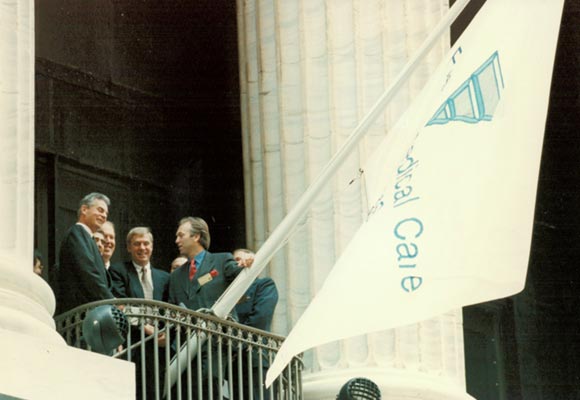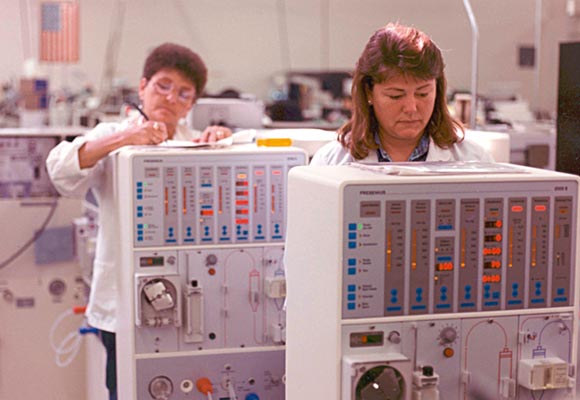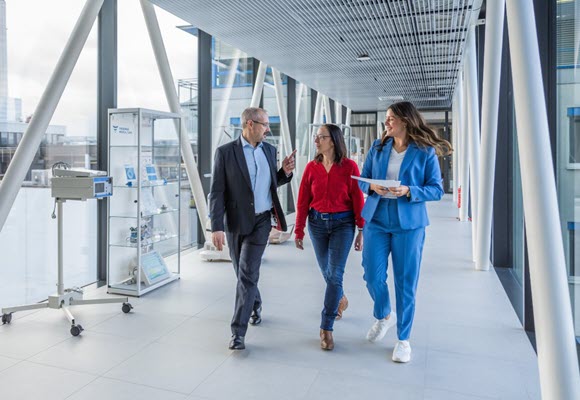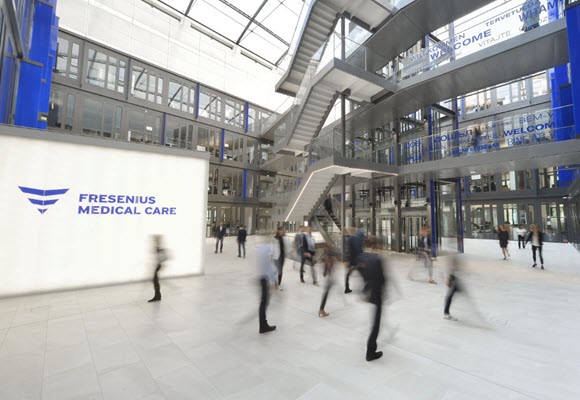Managing sustainability successfully means creating lasting value – economically, ecologically and socially.
Our history

1462
Foundation of the Hirsch Pharmacy in Frankfurt am Main. The Fresenius family assumes ownership in the 18th century.

1912
Dr. Eduard Fresenius, pharmacist and proprietor of the Hirsch Pharmacy commences the production of pharmaceuticals.

1933
The manufacturing company is separated from the Hirsch Pharmacy and moves to Bad Homburg.

1952
Else Fernau, later Else Kröner, takes over the responsibility for the pharmacy and company after she has obtained her degree in pharmacy studies.

1966
Fresenius starts to sell dialysis machines and dialyzers manufactured by various foreign companies and gains substantial market shares.

1974
Fresenius starts to manufacture infusion solutions and medical disposables in St. Wendel, Germany. Today, Fresenius Medical Care produces highly innovative Polysulfone dialyzers in St. Wendel.

1979
In a newly acquired factory in Schweinfurt, Germany, the production of the A2008 dialysis machine begins. The new machine was very successful, and awarded a gold medal for technological innovation at the Leipzig Trade Fair.

1981
The first peritoneal dialysis solution bags were manufactured in St. Wendel, when the system consisted of only one bag including the so-called Safe●Lock ® connector that gave the Safe●Lock ® standard system its name.

1983
The Company takes up the production of synthetic polysulfone fiber membranes for blood purification. These membranes today set the quality standards for dialyzers.

1992
PD Plus, an automated PD therapy option offers a mid-day exchange to enhance the therapy delivered to peritoneal dialysis patients without the need for additional supplies.

1995
Biofine ® is a PVC-free material which has been developed in St. Wendel. Being free from plasticizers it provides advantages for patients and the environment. Biofine ® is thinner than comparable PVC foil and cheaper to produce.

1996
Fresenius Medical Care is founded from a merger of Fresenius Worldwide Dialysis and National Medical Care. The company’s shares are listed at the stock exchanges in Frankfurt and New York.

1999
The 100,000thth dialysis machine comes off the production line. Fresenius Medical Cares’ ordinary share is admitted to the DAX, Germany’s blue-chip share index.

2003
Fresenius Medical Care is the leading dialysis company caring for more than 119,000 patients in own dialysis centers worldwide. With a production output of more than 50 million dialyzers per year the company sets a new record.

2005
The new dialysis therapy system 5008 is introduced in the market and wins the prize “Innovationspreis der Deutschen Wirtschaft”.

2006
Fresenius Medical Care acquired the U.S. dialysis care provider Renal Care Group, Inc. Through its network of around 2.000 dialysis clinics around the world the company provides dialysis treatments to approximately 157,000 patients.
Fresenius Medical Care also transforms its legal form into KGaA.

2007
Fresenius Medical Care continues its success as the leading manufacturer of dialyzers, producing its 500,000,000th dialyzer.

2010
Foundation of a joint venture to develop and sell drugs for patients with chronic kidney disease.

2011
The worldwide expansion of the service business continues by acquiring IDC, Liberty Dialysis Holdings Inc. and American Access Care.

2012
Fresenius Medical Care produces the 500,000thth dialysis machine.

2013
Fresenius Medical Care produces the 1,000,000,000th dialyzer.

2014
A new generation of home dialysis cyclers is launched – sleep•safe harmony – enabling most individualized treatment options with adapted APD (aAPD) therapy.

2016
Launch of the 6008 CAREsystem, a new hemodialysis therapy system, that delivers advanced dialysis therapy more easily, leaving more time for direct patient care.

2018
Fresenius Medical Care launches the 4008A dialysis machine tailored to needs in emerging markets.

2019
By acquiring NxStage Medical, Inc., Fresenius Medical Care expands its product portfolio with an innovative technology for home dialysis offering patients greater flexibility.

2020
Launch of the Global Sustainability Program that will enable us to step up our efforts to integrate sustainability into our business over the next years.
Production of the 2-billionth dialyzer – just seven years after the production of the 1-billionth.

2021
25th anniversary as the world's leading provider of products and services for individuals with renal diseases.

2023
Fresenius Medical Care announces the successful completion of its change of legal form from a partnership limited by shares into a German stock corporation.

2024
Fresenius Medical Care receives the clearance from U.S. Food and Drug Administration (FDA) for our 5008X Hemodialysis System, enabling us to offer high-volume hemodiafiltration (HVHDF) dialysis therapy in the U.S.

2025
Fresenius Medical Care is the leading kidney care company globally with ~300,000 patients and >174m dialyzers per year.
The updated 5008x CAREsystem with additional features receives FDA clearance.
Launch of our new strategy FME Reignite, setting the ambition to lead kidney care through exceptional patient care and innovation.
Related content
-
-
Fresenius Medical Care is the world’s leading provider of dialysis products and services. Find out more about the company’s key facts and innovations.
Investors
Healthcare Professionals
Legal and regulatory
© Fresenius Medical Care AG 2025

